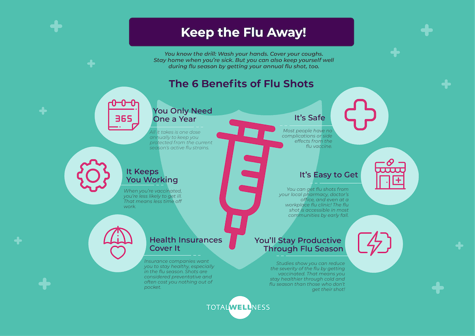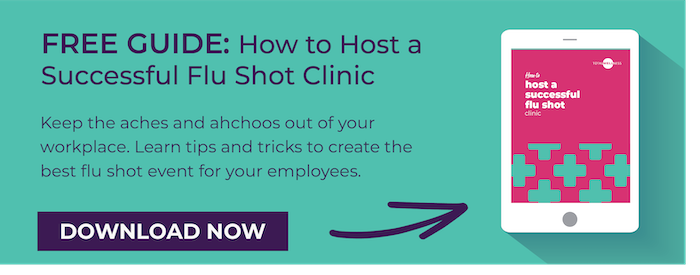The thought of the aches, chills, headaches, and fatigue alone that accompany the flu is enough to make most people cringe. Luckily, one of the biggest benefits of flu shots is that it can lessen the severity of the flu and even prevent it altogether.
Just a few of the reasons to get vaccinated:
- It means less time off work
- It protects those around you
- It lessens the flu’s severity if you get it
Given that last year’s flu season kicked off early and we had the highest recorded level of flu activity since 2012, it’s time to consider the benefits of flu shots now.
And while flu vaccines won’t prevent COVID-19, it can reduce the burden of flu-related cases on the healthcare system to focus care on those infected with COVID-19.
Need a little more convincing?
Here are six reasons to get your flu shot this season:
1. One a Year Will Do
Unfortunately, last year’s flu shot won’t protect you for the upcoming flu season. That’s because there’s always a new strain of viruses that circulate with each new cold and flu season.
Reasons to get your flu shot annually:
- New viruses emerge each season
- Your immunity declines over time
Getting a new one each season means you’ll be more protected against what strain scientists believe will be the strongest. One of the benefits of flu shots is that you only need it once a year!
2. Your Health Insurance Likely Covers It
Thanks to its preventative measures, the flu shot is almost always covered by insurance companies. Most health insurance companies will happily pay for the cost of a flu vaccine.
Before you go:
- Consult an insurance representative
- Check your insurance company’s benefits plan
- Ask about any copays you may have to cover
Many insurance companies consider the flu vaccine a preventative service — much like an annual physical — and will cover the cost 100 percent. In some instances, though, a copay may be required.
3. It Helps You Stay on the Job
Aside from feeling crummy, perhaps the second worst part of having the flu is the missed time off work. Symptoms usually pop up between one to four days after exposure to the virus. After that, the symptoms can linger as long as a week.
Studies show the vaccine can reduce flu severity:
- One 2018 study found adults hospitalized with the flu who were already vaccinated were 59% less likely to have to go into the ICU than those without the vaccine protection.
- In ICU flu patients, those who were vaccinated also spent four days less in the hospital.
Fewer than half of Americans received a flu vaccine last year, according to the CDC. In the same season, nearly 500,000 people were hospitalized from the flu, which usually includes several days of missed work for recuperating.
4. It Reduces Productivity Loss
The flu slows down even the healthiest of people. When you’ve got the flu, it can be hard to get out of bed, let alone work. While you may not completely avoid the flu due to being vaccinated, you’ll be more likely to bounce back quicker since the vaccine can reduce symptoms.
Flu symptoms that can keep you from work:
- Aches
- Fatigue
- Headaches
- Congestion
- Runny nose
By staying generally healthy and out of the hospital, it reduces productivity loss in the workplace, too. The 2019 flu season originally projected an estimated loss of $17 billion for companies, according to one New Jersey Business & Industry Association report.
5. The Vaccine is Easily Accessible
Come flu season, watch how quickly signs pop up for flu clinic or flu vaccinations once the final flu shot is shipped out. Nearly every street corner with a pharmacy on it will have the advertisement for the flu vaccine.
Where can you get the flu shot?
- Flu clinics
- Pharmacies
- Physician offices
- Grocery store pharmacies
Most medical facilities have flu shots and nearly all states allow pharmacists to administer flu shots. So while you’re picking up your vitamin C, consider getting your vaccine while you’re at it. If you’re an employer, consider setting up a flu clinic for all of your employees in the early fall to make it even easier for them to get it done.
6. It’s Safe to Get
For those who have never received the flu shot, it’s understandable to question side effects. Luckily, it’s rare that individuals who get the flu shot have serious complications that occur due to flu vaccination.
Side effects of the flu shot may include:
- Fever
- Nausea
- Sore arm
- Headache
- Muscle aches
- Redness at the injection site
The most common side effect is a sore arm and potentially redness at the injection site — both are easily treatable! If you do get any of the other side effects, the CDC reports most resolve within a few days and are generally mild.
Reap the Benefits of Flu Shots Early in the Season
So, when is the best time to get your flu shot?
The optimal time to receive the benefit of flu shots is prior to influenza activity starting to make its way around your community. You’ll find most healthcare providers have a vaccine to give patients before the end of October.
Even if you’re late in scheduling your flu vaccine, you’ll often find it recommended all season long. Despite getting a flu shot late, you’ll still receive protection through the end of flu season which is late spring.
If you do decide to get the flu shot, aim for well before flu season activity picks up. On average, it takes about two weeks for the vaccination antibodies to develop and protect you against the flu. Most healthcare facilities and flu clinics will keep the vaccine in stock as long as the season’s influenza viruses are circulating.
Start looking ahead to the flu season now. Download your free guide 7 Ways to Prepare Your Office for Flu Season to learn the steps to take to protect your team from the flu.




